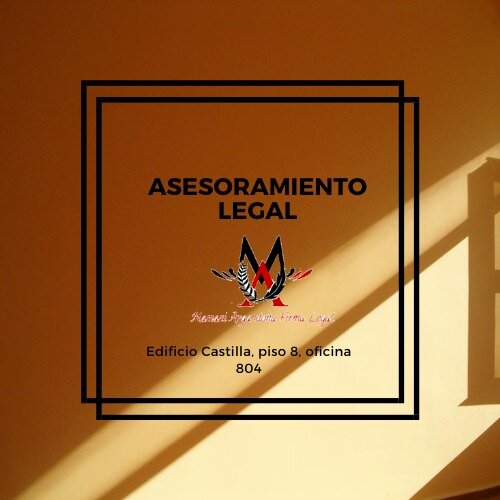Best Public-Private Partnerships (PPP) Lawyers in La Paz
Share your needs with us, get contacted by law firms.
Free. Takes 2 min.
List of the best lawyers in La Paz, Bolivia
About Public-Private Partnerships (PPP) Law in La Paz, Bolivia
Public-Private Partnerships, commonly known as PPPs, are collaborative agreements between government entities and private sector companies for the financing, development, operation, and maintenance of public infrastructure or services. In La Paz, Bolivia, PPPs have emerged as key mechanisms for advancing public projects in sectors such as transportation, water supply, health, and urban development. They are designed to leverage private expertise and capital while achieving public sector goals, delivering value to the community, and ensuring long-term service provision.
The legal framework for PPPs in Bolivia is aimed at balancing public interest with private incentives, ensuring transparent processes, fair competition, and accountability throughout the lifecycle of the partnership. Understanding the local PPP landscape is essential for both public and private participants seeking to enter into these agreements in La Paz.
Why You May Need a Lawyer
Navigating Public-Private Partnerships in La Paz can be complex, involving detailed contracts, regulatory approvals, financing arrangements, and ongoing compliance requirements. You may need legal assistance in the following situations:
- Evaluating prospect PPP projects and understanding eligibility requirements
- Conducting due diligence on project feasibility and risk allocation
- Drafting, negotiating, and reviewing PPP contracts and concession agreements
- Complying with public procurement and competition laws
- Securing project finance and handling investment protection issues
- Navigating dispute resolution mechanisms and enforcement procedures
- Addressing labor, environmental, and social impact requirements
- Dealing with changes in legislation or governmental policies
- Protecting your rights during the project renegotiation or termination
- Responding to audits, administrative investigations, or public scrutiny
A specialized PPP lawyer can help you understand your obligations and rights, minimize legal risks, and ensure that your project complies with Bolivian law.
Local Laws Overview
The legal environment governing Public-Private Partnerships in La Paz is shaped by several national and municipal laws. Bolivia regulates PPPs primarily through the Investment Promotion Law (Law No. 516), sector-specific regulations, and various administrative decrees. Key elements typically include:
- Project Identification - PPP projects must align with public priorities and development plans established by local and national authorities
- Procurement Procedures - Open, competitive bidding is generally required, with clear evaluation criteria and transparency in selection
- Contractual Framework - PPP agreements define the roles, responsibilities, and risk sharing between public and private partners
- Financial Arrangements - Guidance on structuring payments, tariffs, guarantees, and investment protections
- Monitoring and Oversight - Ongoing regulation and audit by designated government bodies, with performance monitoring
- Dispute Resolution - Provision for administrative reviews, arbitration, or court proceedings in case of disputes
- Termination and Reversion - Rules for contract renewal, modification, or early termination, including asset reversion to the state
- Legal and Regulatory Compliance - Adherence to environmental, labor, and safety regulations, as well as anti-corruption obligations
Local government ordinances in La Paz may also establish specific requirements or opportunities for municipal PPP projects, including approval processes and public participation.
Frequently Asked Questions
What is a Public-Private Partnership (PPP)?
A PPP is a structured collaboration between a government agency and a private entity to finance, build, and operate projects that serve the public, such as roads, hospitals, or utilities.
Why are PPPs used in La Paz, Bolivia?
PPPs are used to mobilize private investment and expertise for public infrastructure and service projects, addressing budget constraints, promoting innovation, and improving service quality.
Who regulates PPP projects in La Paz?
PPP projects are regulated by a combination of national agencies, such as the Ministry of Development Planning, sector-specific regulators, and the local municipal government of La Paz.
How are PPP projects selected and approved?
Projects are identified based on social and economic priorities, then subjected to feasibility analysis and public procurement processes before approval by the relevant authorities.
What are the obligations of the private partner in a PPP?
Private partners are typically responsible for financing, constructing, operating, and maintaining the project, while meeting quality and performance standards specified in the contract.
Can foreign companies participate in PPPs in La Paz?
Yes, foreign companies may participate, provided they comply with Bolivian investment regulations and the specific requirements of the bidding and procurement processes.
How are risks shared in PPP agreements?
Risks such as construction, financial, operational, and demand risks are allocated between the public and private partners according to the terms of the PPP contract.
What legal remedies are available in case of disputes?
Parties can use administrative procedures, arbitration, or local courts, depending on the dispute resolution clauses in the PPP contract and Bolivian law.
Are there incentives for private investors in Bolivian PPP projects?
Yes, the government may offer incentives such as tax benefits, guarantees, or tariff adjustments, particularly for projects of national or social interest.
What happens when a PPP contract ends?
Upon contract completion or early termination, project assets may revert to the state, and the private partner must fulfill any handover requirements specified in the agreement.
Additional Resources
If you are seeking more information or assistance on PPPs in La Paz, the following organizations and governmental bodies can be useful:
- Ministry of Development Planning (Ministerio de Planificación del Desarrollo) - Main regulator for investment promotion and PPP projects
- Municipal Government of La Paz (Gobierno Autónomo Municipal de La Paz) - Manages municipal-level PPP initiatives and approvals
- Bolivian Chamber of Construction (Cámara Boliviana de la Construcción) - Provides guidance for private sector involvement in infrastructure projects
- National Agency for Public Procurement (Agencia de Contrataciones y Adquisiciones del Estado) - Oversees public tenders and procurement regulations
- Local legal and financial advisory firms specializing in PPPs and infrastructure law
Next Steps
If you are considering participation in a PPP project or need legal advice in La Paz, Bolivia, follow these steps:
- Collect all relevant information about the proposed project, including objectives, stakeholders, and available documentation
- Consult with a legal professional experienced in PPP and infrastructure law in Bolivia to assess your options and compliance requirements
- Conduct a preliminary risk and feasibility analysis to identify potential legal, financial, and operational challenges
- Prepare necessary documents and ensure readiness for tender or negotiation processes
- Engage in open dialogue with regulators and potential public or private partners to clarify expectations and obligations
Taking a proactive approach and seeking specialized legal support can help you navigate the complexities of PPPs in La Paz and increase the likelihood of project success.
Lawzana helps you find the best lawyers and law firms in La Paz through a curated and pre-screened list of qualified legal professionals. Our platform offers rankings and detailed profiles of attorneys and law firms, allowing you to compare based on practice areas, including Public-Private Partnerships (PPP), experience, and client feedback.
Each profile includes a description of the firm's areas of practice, client reviews, team members and partners, year of establishment, spoken languages, office locations, contact information, social media presence, and any published articles or resources. Most firms on our platform speak English and are experienced in both local and international legal matters.
Get a quote from top-rated law firms in La Paz, Bolivia — quickly, securely, and without unnecessary hassle.
Disclaimer:
The information provided on this page is for general informational purposes only and does not constitute legal advice. While we strive to ensure the accuracy and relevance of the content, legal information may change over time, and interpretations of the law can vary. You should always consult with a qualified legal professional for advice specific to your situation.
We disclaim all liability for actions taken or not taken based on the content of this page. If you believe any information is incorrect or outdated, please contact us, and we will review and update it where appropriate.










